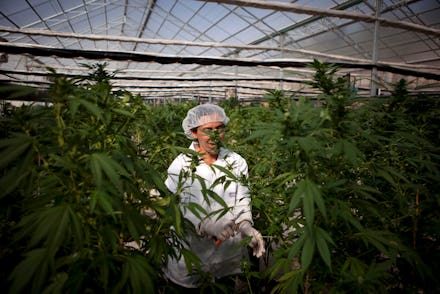Two East Coast States Just Took a Huge Step Forward With Medical Marijuana

The news: It's been a good week for medical marijuana activists. Not only has the Senate proposed an amendment to ban the Justice Department from going after dispensaries that legally operate under state laws, Florida and New York are also set to become the 23rd and 24th states to legalize pot for medical use.
On Monday, Florida Gov. Rick Scott signed into law the use of a noneuphoric strain of marijuana. And on Thursday, New York Gov. Andrew Cuomo announced a similar deal with lawmakers that will make non-smokeable cannabis available for patients. Both states will impose restrictions on what kind of marijuana can be used and how it can be delivered to patients. But for now, they represent significant moves from governors who have previously opposed legalization in any form.
In Florida: The law, nicknamed "Charlotte's Web," is named after a strain of marijuana that is high in cannabidiol (CBD) but low in tetrahydrocannabinol (THC), the compound that causes a high. Doctors and parents have argued that it is especially effective in treating pediatric epilepsy, and it has also been used to treat Lou Gehrig's disease and side effects of cancer. The move to legalize medical pot has been widely supported throughout the state:
Image Credit: Quinnipiac
Scott has said that he opposes medical marijuana, but Florida voters will have a chance to call for broader legislation this fall through a referendum. If the vote passes, it will allow doctors to prescribe more forms of marijuana for a wider range of conditions. But the new law will allow doctors to start prescribing Charlotte's Web next January, which will be sold through licensed dispensaries.
In New York: Like Florida, New York will only allow non-smokeable forms of marijuana for now, such as edibles, cannabis oil and vaporization. Medical marijuana will be allowed to be prescribed for a dozen diseases, including cancer, AIDS and epilepsy. Tax will be set at 7% of gross sales, and the program is set to start running within 18 months, though it can be suspended by the governor.
Image Credit: New York Daily News
"There are certainly significant medical benefits that can be garnered," Cuomo said. "At the same time, it's a difficult issue because there are also risks that have to be averted — public health risks, public safety risks — and we believe this bill strikes the right balance."
But critics believe that the program is too narrow. New York state Sen. Diane Savino and Assemblyman Richard Gottfried are pushing a broader medical marijuana bill, hoping they can reach an agreement before this year's session ends next week.
A nationwide push: Now that Minnesota, Florida and New York have passed — or are close to passing — medical marijuana bills, that means nearly half the country is allowing patients to use prescribed pot. The map below doesn't reflect these latest additions, but it gives a sense of which areas of the country are resisting medical marijuana:
Image Credit: CNN
However, public opinion indicates that Americans want not only pot for medical reasons, but also for recreational use. A recent poll by Pew Research Center found that three-quarters of Americans believe that pot legalization is inevitable, while a Gallup poll last year found that a majority of Americans favored legalization for the first time.
This rising support is cemented by the fact that the states that have legalized recreational pot have seen some encouraging results already, from high sales to an actual decline in crime.
Politicians are budging on the issue as well. President Barack Obama has previously stated that he believes marijuana is not more dangerous than alcohol and Attorney General Eric Holder said in April that the Obama administration is considering removing marijuana from the list of Schedule I substances. Given the momentum that medical marijuana has had lately, it might be sooner than later that other states jump on the bandwagon.